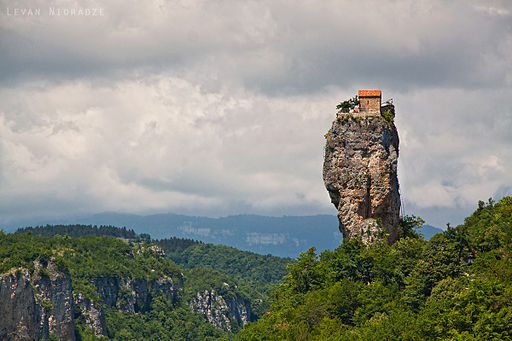
(This is one of my most popular bylines. It's a bit dated now; anybody else remember that "Coffee Achievers" ad campaign, wherein the coffee industry tried to flog their product as health food? But the sentiments remain mine, and I still get kind words about it from time to time. For any friends who missed it, and those who have asked for a valid URL, here it is.)
For a nation whose birthing cry was an act of vandalism protesting the high price of tea, Americans are strangely ambivalent on the subject today. While working-class guys in India, Japan and the UK belt down tea by the thermos-capful with nary a qualm, American men write it off as wimp juice. It's a historical riddle, really. The mere suggestion that tea might be unmanly would have prompted those paint-smeared, buckskin-clad Bostonians of yesteryear to heave the sceptic into the harbour like so much top-grade pekoe, yet their descendants fear the stuff like tight briefs. How did we fall so far?
It's tempting to pin the demise of the noble leaf in America on coffee. As a he-man beverage, coffee brings a lot to the party. It looks bad. It tastes bad. It smells... OK, it smells pretty good. But coffee boasts up to four times the caffeine of black tea, as well as lurid health hazards that the laid-back tea leaf can only dream of. In other words, coffee is macho. All told, it logs in slightly below blowfish and a little above football on the Pain-Indexed Virility Scale. Madison Avenue knows this, at one point hiring no less a guy-icon than the great Joe DiMaggio to hawk one of the first drip coffee machines.
But none of this explains why simple, honest tea strains under the stigma of unmanliness. Maybe signing Joltin' Joe to push caffeine was a no-brainer, but would someone tell me why Mr. Coffee's manly glass belly now reflects the dainty porcelain curves of Mrs. Tea? She's not even Ms. Tea. This alleged machine (just what does a "tea maker" do, anyway?) isn't just targeted at women, it's targeted at old women.
Not that it really makes a difference. A TV ad for bottled tea ran in heavy rotation a few summers back. The spots initially captured my attention because they featured a shouting male voice-over of the sort usually heard bellowing, "Sixty-four MONSTER TRUCKS!!! Meet Playboy's MISS AUGUST!!! BE THERE!!!" over your car radio. Unremittingly masculine... until you notice that the rebellious young tea-slammers are three unremittingly feminine supermodels. "This ain't no SIPPING TEA!!!" sneers the announcer. Apparently, being gulped is all the envelope-pushing that tea can stand.
I don't get it. Time was, men were men, and men drank tea. (When they weren't launching it into the bay, that is.) The intrepid mountain men of the Hudson's Bay Company so relied on tea to maintain their masculine mystique that they seeded the West with the Labrador tea plant, whose leaves they used to stretch or replace precious stores of black tea. That's right: rugged outdoorsmen, known to go a year between baths, collapsed in a quivering mass if a tea bog were more than a day's schlep away. Think of it as the early-nineteenth-century equivalent of the latte stand. And, hold on to your boxers, brothers: now we're talking about herbal tea.
Of course, guys used to wear wigs and face powder too, habits generally frowned-upon in locker rooms today. But let's face it: for the man of action, tea beats the pants off coffee. All you need is reasonably tasty organic matter and boiling water. No fuss, no gizmos, no blackboard with x's and o's on it. Hot water. Leaves. Tea. Yet somehow, between Lewis and Clark's tea-fueled expedition to the Pacific and the Civil War, American guys stepped off the tea wagon. And we've been chumps ever since. Yankee and Rebel soldiers brewed coffee over their tiny campfires, packing the clanking paraphernalia in their marching kits and waiting, feet ice-cold in the snow, while it took its sweet time perking up. Ditto the cowboys. American soldiers in this century dipped barely-drinkable boiled coffee from a huge cauldron; the last GIs in line got half a cup of grounds. These days, soldiers fall back on MRE packets of "instant coffee-type beverage, hot."
This beats a pot of tea? Given a fistful of decent leaves and a heat source, a guy can brew the same cup of darjeeling on Mt. Everest that he enjoys in his living room. And he can drink it before he succumbs to hypothermia. Now how much would you pay?
In the end, logical arguments are really beside the point. This is ultimately an emotional issue, turning less on what men do than how we feel about it. Given that the words "I feel" frighten us even more than tea, it may be some time before American men come home to tea. But it's a shame. My own British background steeped me in "tea sense," a Pavlovian reaction to tea's aromatic khaki swirl that science has yet to confirm. But you can take my word for it. As long as tea is up, I'm all right. You say my girlfriend ran off with my record collection? I put on the kettle. Have I slogged ten miles in mud and freezing rain, with ten more yet to go? My backpacking stove heats a quart of water in two minutes. My agent called to say she could sell my manuscript on auto maintenance, if only it had a sex scene? A splash of hot water and a spot of milk restore equilibrium to an unbalanced world.
The re-hinging power of tea is real, and real men respect it. A retired US Army officer I once interviewed remembered watching Royal Air Force pilots blast enemy fighters out of the North African sky for hours on end. At the first lull, the Englishmen would land their Spitfires, leap onto the sand, and pour a hasty cup of tea. Forty years later, the American still remembered how the twentysomething flyers called each other "old man" and chatted like businessmen on an evening train. But not for long. Soon, another squadron of Messerschmitts would come snarling over the dunes. Exhausted, grimy, hungry, the RAF men dumped the lees of their cuppa in the dust and, with a quiet "Tally ho!", roared off to defy death again.
Coffee achievers, indeed.
(Text previously appeared in The Herb Tea Book, Interweave Press,1998. Photo of Pietro da Cortona's Ananias Restoring the Sight of St. Paul [NOTE BOY ON RIGHT SERVING TEA -- COINCIDENCE? I THINK NOT] courtesy of Wikimedia Commons and a generous photographer.)












